名词性分句考点归纳
名词性从句用法归纳(精选多篇)

名词性从句用法归纳(精选多篇)第一篇:名词性从句用法归纳名词性从句:在句子中起名词作用的句子叫名词性从句(Noun Clauses)。
名词性从句在复合句中能担任:主语、宾语、表语、同位语、介词宾语等。
名词性从句分为:主语从句、宾语从句、表语从句和同位语从句。
一、引导名词性从句的连接词引导名词性从句的连接词可分为三类:1、从属连词(5个):(1)that无词义,在从句中不做成分,在宾语从句或表语从句中that有时可以省略(2)whether,if 有词义,在从句中不做成分(whether,if均表示“是否”之意,表明从句内容的不确定性)不可以省略(3)as if, as though(均表示“好像”,“似乎”之意)在从句中不做成分2、连接代词(9个):what, whatever, who, whoever, whom, whomever, whose, which, whichever,有词义,在从句中做成分,不可以省略(who what which 在从句中做主语、宾语、其中what 指代没有范围的事物,which指代有范围的事物,表“选择哪一个”whom做宾语whose 做定语)3、连接副词(7个):when, where, how, why, whenever, wherever, however有词义,在从句中做状语,不可以省略4、that省略的情况:(1)定语从句中做宾语(2)that引导宾语从句时(3)that引导表语从句时(4)主语从句中it做形式主语,that从句置于句末时5、that不可省略的情况:(1)定语从句中做主语(2)由that引导主语从句放句首时(3)that引导同位语从句时(4)宾语从句中i it做形式宾语,真正的that宾语从句中that不可以省略ii 一个句子有两个或多个并列的宾语从句时,引导第二个和以后几个句子中的that不可以省略iii 与动词相隔的宾语从句,不可以省略iv that引导的宾语从句放在句首时,不可以省略二.主语从句1、主语从句:作句子主语的从句叫主语从句。
名词性从句考点归纳

名词性从句考点纳概念: 在整个句中起名词作用的从句,包括主语从句、宾语从句、表语从句和同位语从句。
判断:主语从句在谓语动词前,且常用形式主语it宾语从句在动词、介词、形容词后表语从句在系动词后(be, seem, look等)同位语从句在名词后且引导词在从句中不作成分连接词分为三类:从属连词:that, (不充当从句的任何成分, 不可省,没有意义whether/ if (不充当从句的任何成分,不可省,“是否”的意思)连接代词:what(ever), who(ever), whom(ever), which(ever),whose: 充当主、宾、表、定连接副词:when, where, how, why (充当状语)名词性从句的做法1.判断2.从句中缺什么给什么考点一:what vs. thatwhat 在句中充当成分,后面跟意思是:that在从句中充当成分,后面跟,意义you have done might do harm to other people.you don’t like him is none of my business.考点二:that 的省略●由连接词that引导从句时,that 在句中不担任任何成分,在口语或非正式的文体中常被省去,但是,从句是并列句时,第二个分句及以后的分句前的that 。
He told me (that) he will go to Shanghai tomorrow and he will visit many sights.●that位于句首引导主语从句时,不能省略。
He will win the match is certain.It is certain that he will win the match.he will win the match is certain.考点三:whether vs. if在名词性从句中表示“是否”多用,if 只用于引导从句。
高考英语语法考点归纳总结
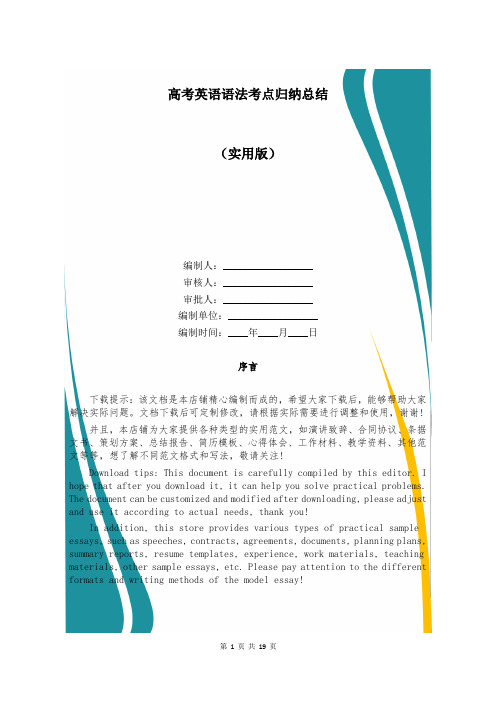
高考英语语法考点归纳总结(实用版)编制人:__________________审核人:__________________审批人:__________________编制单位:__________________编制时间:____年____月____日序言下载提示:该文档是本店铺精心编制而成的,希望大家下载后,能够帮助大家解决实际问题。
文档下载后可定制修改,请根据实际需要进行调整和使用,谢谢!并且,本店铺为大家提供各种类型的实用范文,如演讲致辞、合同协议、条据文书、策划方案、总结报告、简历模板、心得体会、工作材料、教学资料、其他范文等等,想了解不同范文格式和写法,敬请关注!Download tips: This document is carefully compiled by this editor. I hope that after you download it, it can help you solve practical problems. The document can be customized and modified after downloading, please adjust and use it according to actual needs, thank you!In addition, this store provides various types of practical sample essays, such as speeches, contracts, agreements, documents, planning plans, summary reports, resume templates, experience, work materials, teaching materials, other sample essays, etc. Please pay attention to the different formats and writing methods of the model essay!高考英语语法考点归纳总结高考英语语法考点归纳总结2023年语法对英语作答比较重要,语法记得不扎实,那么写出来的文章就会漏洞百出,逐字翻译,词不达意就会导致英语作文文章的失败。
高中英语句法大全-名词性从句

高中英语句法大全-名词性从句名词性从句一.概念名词性从句共有四种:主语从句,表语从句,宾语从句和同位语从句二.相关知识点精讲1.主语从句:主语从句在整个句子中作主语。
(1)不同于其它的连词,它不充当句子的成分,只是单纯的连接词,通常不可以省略。
分句置于句首时,that绝对不可以省略。
That the driver could not control his war was obvious.It was obvious that the driver could not control his car.(2)if 不能用在主语从句中,而是用whetherWhether he left (or not) is unknown(3)当主语从句作主语时,谓语动词一般用第三人称单数,下面这个句型例外。
What we need is more time and money.What we need are many more books.2.表语从句:表语从句出现在系动词后,充当表语。
The trouble is that we are short of money.Go a nd get your coat. It’s where you left it.(1) 引导表语从句除了上述三类词外还有because, as if/ as though等等The reason (why/for which…..) is that ……It/This/That is because……(2) 连系动词“appear, look, seem”的两个常用句型It seems/appears that….It looks/seems as if/as though……(与事实相符用陈述语气,与事实相反用虚拟语气) (3) as 也可以引导表语从句Things are not always as they seem to be3. 宾语从句:及物动词,形容词和介词后加宾语从句作其宾语。
句子成分定语从句名词性从句状语从句详解

句⼦成分定语从句名词性从句状语从句详解句⼦成分⼀.动词基本分类:1.实义动词包括及物(vt)和不及物(vi)vt 直接带宾语He likes English. V i 不需带宾语Did he come yesterday? 若要带宾语中间需加介词He arrived at the airport .2. 连系动词如:be/ look/sound/keep/taste/smell/taste/seem/become/turn/remain (依然)…3. 助动词:本⾝⽆意义,要与实义动词组成谓语。
如:do/does/will/would/have/hasHe has gone to Beijing. He will leave for Beijing.4情态动词:can/could/ may/might…⼆.副词⼀般修饰动词/形容词/副词基本分类:1 时间副词now/ago/once/already…2 地点副词here/downstairs/back /outside/ off…3 ⽅式副词carefully/fast/suddenly…4 程度副词almost/very/so/much/deeply…5 频度副词always/ usually/sometimes…三.句⼦成分:构成句⼦的各个部分。
A.主语- 可由以下表⽰:1.名词:American music has become more and more popular.2.代词:Who is the man standing over there?3.数词:One-third of the students are girls.4.不定式:To swim in the river is a great pleasure.= It is a great pleasure to swim in the river (It 是形式主语) 5.动名词:Smoking does harm to the health.6.从句:When we are going to have the test is clear.B. 谓语在句中⼀般由动词充当1.He practices running every morning.2.He has caught a cold.3.We may keep the book for two weeks.C. 表语⼀般位于系动词之后可由以下表⽰:1.代词:Is it yours/ It is mine.2.形容词:The weather has turned cold.3.分词:The teacher is pleased with my work.4.不定式:His job is to teach English.5.动名词:His hobby is playing football.D. 宾语⼀般位于Vt 或介词之后可由以下表⽰:1.名词:He is going to buy a dictionary.2.代词:We should learn from him.3.不定式:He decided not to see me.4.动名词:He practices running every morning.分类:分为直接宾语(动作的承受者,通常指物)和间接宾语(动作所向的⼈或物,通常指⼈)He sent me a present.=He sent a present to me. (me 间宾/ a present 直宾)He bought her a map= He bought a map for her.有些Vt 如:make/have/get/let/find/call/see/notice/hear/watch除了跟有⼀个宾语外,还要有⼀个宾语补⾜语来说明宾语的状态才能使句⼦完整。
高考必考语法精讲精练专题十:名词性从句(含解析)
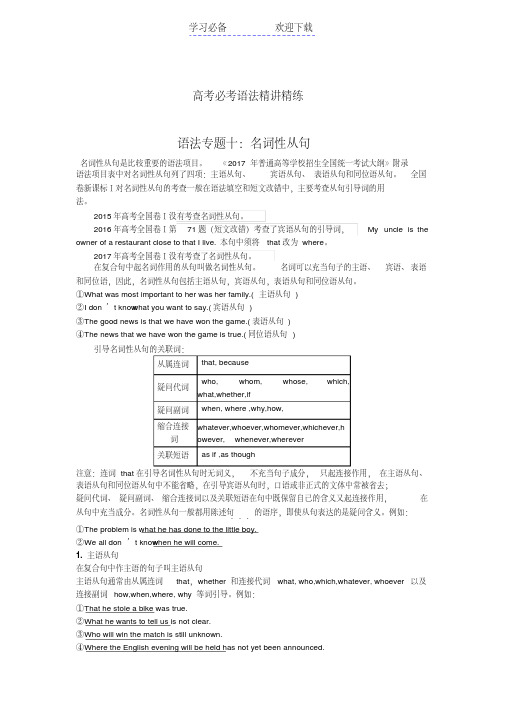
高考必考语法精讲精练语法专题十:名词性从句名词性从句是比较重要的语法项目。
《2017年普通高等学校招生全国统一考试大纲》附录语法项目表中对名词性从句列了四项:主语从句、宾语从句、表语从句和同位语从句。
全国卷新课标Ⅰ对名词性从句的考查一般在语法填空和短文改错中,主要考查从句引导词的用法。
2015年高考全国卷Ⅰ没有考查名词性从句。
2016年高考全国卷Ⅰ第71题(短文改错)考查了宾语从句的引导词,My uncle is the owner of a restaurant close to that I live.本句中须将that改为where。
2017年高考全国卷Ⅰ没有考查了名词性从句。
在复合句中起名词作用的从句叫做名词性从句。
名词可以充当句子的主语、宾语、表语和同位语,因此,名词性从句包括主语从句,宾语从句,表语从句和同位语从句。
①What was most important to her was her family.(主语从句)②I don’t know what you want to say.(宾语从句)③The good news is that we have won the game.(表语从句)④The news that we have won the game is true.(同位语从句)引导名词性从句的关联词:从属连词that, because疑问代词who, whom, whose, which, what,whether,if疑问副词when, where ,why,how,缩合连接词whatever,whoever,whomever,whichever,h owever, whenever,wherever关联短语as if ,as though注意:连词that在引导名词性从句时无词义,不充当句子成分,只起连接作用,在主语从句、表语从句和同位语从句中不能省略,在引导宾语从句时,口语或非正式的文体中常被省去;疑问代词、疑问副词、缩合连接词以及关联短语在句中既保留自己的含义又起连接作用,在从句中充当成分。
主谓一致简明归纳
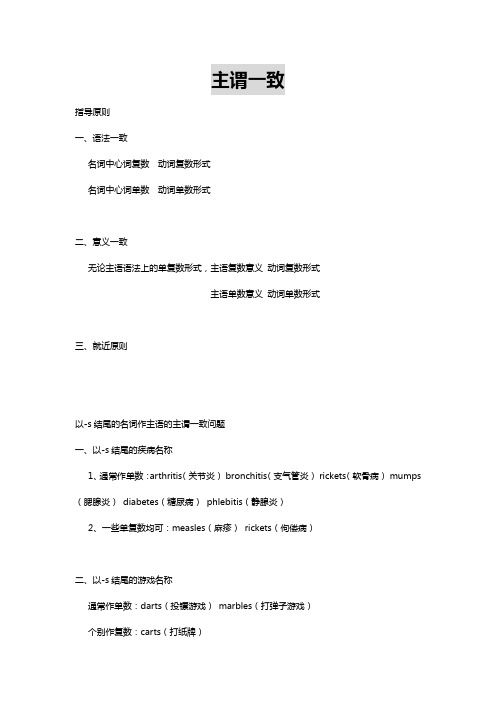
主谓一致指导原则一、语法一致名词中心词复数动词复数形式名词中心词单数动词单数形式二、意义一致无论主语语法上的单复数形式,主语复数意义动词复数形式主语单数意义动词单数形式三、就近原则以-s结尾的名词作主语的主谓一致问题一、以-s结尾的疾病名称1、通常作单数:arthritis(关节炎)bronchitis(支气管炎)rickets(软骨病)mumps (腮腺炎)diabetes(糖尿病)phlebitis(静腺炎)2、一些单复数均可:measles(麻疹)rickets(佝偻病)二、以-s结尾的游戏名称通常作单数:darts(投镖游戏)marbles(打弹子游戏)个别作复数:carts(打纸牌)注意:当darts,marbles等用于做这些游戏所用的镖或弹子等意义时,其复数形式仍作复数意义用。
三、以-ics结尾的学科名称某些通常作单数:physics(物理学)mathematics(数学)mechanics(机械学)optics (光学)acoustics(声学)politics(政治)statistics(统计学)economics(经济学)linguistics(语言学)athletics(体育学)tactics(兵法)注意:当这些表示“学科”以外的其他意义,可作复数用:mathematics(运算能力)athletics(体育运动)acoustics(音响效果)tactics(策略)economics(经济意义)四、以-s结尾的地理名称1、国名作单数:the United States(美国)the United Nations(联合国)the Netherlands(荷兰)2、群岛、山脉、海峡、瀑布等通常作复数:the West Indies(西印度群岛)the Himalayas (喜马拉雅山脉)the Straits of Gibraltar(直布罗陀海峡)the Niagara Falls(尼亚加拉大瀑布)五、其他以-s结尾的名词1、由两个部分组成的物体名称通常以-s结尾单独使用通常作复数带有“一把”、“一副”、“一条”等单位词单位词的单复数决定动词的单复数形式如:scissors(剪子)、pincerts(钳子)、glasses(眼镜)、shorts(短裤)、trousers(裤子)、suspenders(吊裤带)等。
专四英语之分词动名词及名词性从句知识讲解

一、分词、动名词、独立主格结构等简要用法分词用法如下:分词作状语,一般直接出现在开头,后面加句子。
a)主动结构做状语,前面状语隐含主语与后面句子主语一致。
(Not)Being a student/sick/in the room,加句子(Being sick, he feels sad.)(Not)Having been a student/sick/in the room, 加句子( Having been sick, he stays at home.) (Not)Doing, 加句子(Smiling, he came into the room.)(Not)Having done,加句子(Having finished his homework, he returned home.)He came in, smiling.(本句子中的状语smiling放在后面而不是前面)b)被动结构做状语,前面状语隐含主语与后面句子主语一致。
(Not)Done,加句子(Written, the letter was put on the table.)(Not)Being done,加句子(Being written, the letter hasn’t been finished yet.)(Not)Having been done,加句子(Having been written, the letter is put on the table.)He came in, excited(本句子中的状语excited放在后面而不是前面)c)分词作定语The letter (which was )written yesterday is on the tableThe letter (which is) being written now is on the table.The letter (which is )to be written tomorrow is on the table.The man who has survived(having survived ) the earthquake is my friend.The man (who is )dancing here now is my friend.2. 独立主格结构a)主动形式的独立主格结构名词/代词+being a student/sick/in the room,加句子(He/Mary being sick, he feels sad.)名词/代词+having been a student/sick/in the room, 加句子( He/Mary having been sick, he stays at home.)名词/代词+doing, 加句子(He/Mary Smiling, Peter came into the room.)名词/代词+having done,加句子(He/Mary having finished his homework, he returned home.) b)被动形式的独立主格结构名词/代词+done,加句子(He/Mary punished, he feels sad.)名词/代词+being done,加句子(He/Mary being punished, he feels sad.)名词/代词+having been done,加句子(He/Mary having been punished, he feels sad.)3. 动名词,顾名思义,具有名词属性,做主语或宾语,做宾语时要么做动词宾语,要么做介词宾语。
英语语法PPT之名词性分句nominal clause

补语
问题是我们应该采取什么具体的措施来应对这次紧急情况。
The trouble is what concrete measures we should take
to cope with the emergency.
这正是我们与他意见不同的地方。
That is just where we disagrees with him. 他第一个问题就是罪犯抓住没有。 His first question was whether the criminal had been
corporation needs most.
some typical nominal clauses as subject It doesn’t matter + nominal clause…
It is said / reported that…
It happens / occurs / turns out / comes about / chances / follows that… It is + noun / adjective / participle + nominal clause
today.
无论是谁,只要犯了罪就必须受到严惩。 Whoever has committed the crime must be severely punished.
宾语
他很清楚地表明他不会改变主意的。
He made it quite clear that he would not change mind. 他并没有说是否会留在这个国家。 He didn’t say whether or not he would stay in the
完整版)名词性从句用法归纳
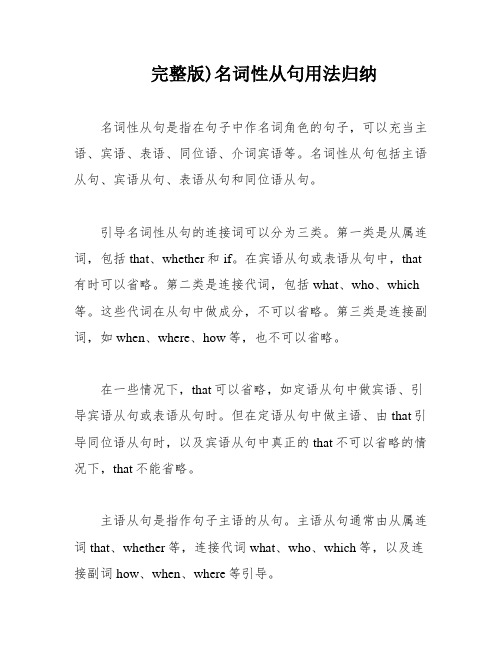
完整版)名词性从句用法归纳名词性从句是指在句子中作名词角色的句子,可以充当主语、宾语、表语、同位语、介词宾语等。
名词性从句包括主语从句、宾语从句、表语从句和同位语从句。
引导名词性从句的连接词可以分为三类。
第一类是从属连词,包括that、whether和if。
在宾语从句或表语从句中,that 有时可以省略。
第二类是连接代词,包括what、who、which 等。
这些代词在从句中做成分,不可以省略。
第三类是连接副词,如when、where、how等,也不可以省略。
在一些情况下,that可以省略,如定语从句中做宾语、引导宾语从句或表语从句时。
但在定语从句中做主语、由that引导同位语从句时,以及宾语从句中真正的that不可以省略的情况下,that不能省略。
主语从句是指作句子主语的从句。
主语从句通常由从属连词that、whether等,连接代词what、who、which等,以及连接副词how、when、where等引导。
2、连接词的使用:连接词在句子中起到连接的作用,其中that在句子中没有实际的意义,只是起到连接从句和主句的作用。
而连接代词和连接副词则在句子中既保留了自己的疑问含义,又起到连接从句和主句的作用,同时在从句中充当从句的成分。
例如,whom和who指人,what指物,而XXX和whoever则表示泛指意义。
举个例子,What he wants to tell us is not clear.表示他想告诉我们什么并不清楚。
另外,为了避免句子头重脚轻的情况,有时我们会用形式主语it代替主语从句,并将主语从句放在句末。
这种情况下,主语从句后的谓语动词一般使用单数形式。
常用的句型有:(1)It + be +名词+ that从句,如It is a fact that(事实是);(2)It + be +动词的过去分词+ that从句,如It is said that(据说);(3)It +不及物动词(vi)+ that从句,如It seems that (似乎);(4)It + be +形容词+ that从句,如It is naturalthat(很自然)。
高三英语语法讲义——名词性从句
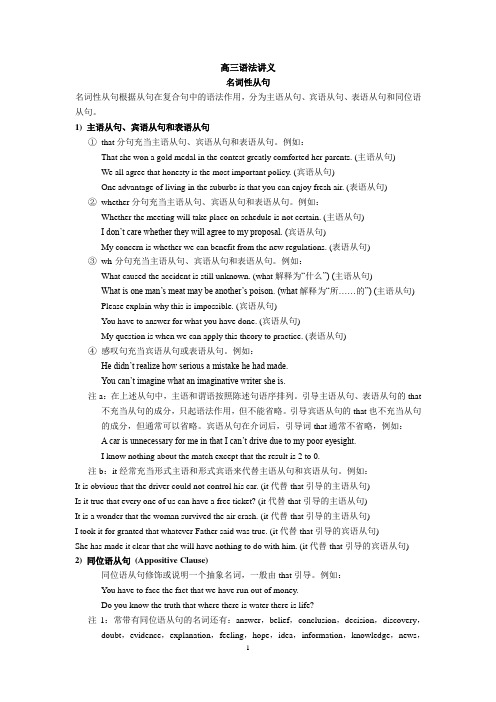
高三语法讲义名词性从句名词性从句根据从句在复合句中的语法作用,分为主语从句、宾语从句、表语从句和同位语从句。
1) 主语从句、宾语从句和表语从句①that分句充当主语从句、宾语从句和表语从句。
例如:That she won a gold medal in the contest greatly comforted her parents. (主语从句)We all agree that honesty is the most important policy. (宾语从句)One advantage of living in the suburbs is that you can enjoy fresh air. (表语从句)②whether分句充当主语从句、宾语从句和表语从句。
例如:Whether the meeting will take place on schedule is not certain. (主语从句)I don’t care whether they will agree to my proposal. (宾语从句)My concern is whether we can benefit from the new regulations. (表语从句)③wh-分句充当主语从句、宾语从句和表语从句。
例如:What caused the accident is still unknown. (what解释为“什么”) (主语从句)What is one man’s meat may be another’s poison. (what解释为“所……的”) (主语从句)Please explain why this is impossible. (宾语从句)You have to answer for what you have done. (宾语从句)My question is when we can apply this theory to practice. (表语从句)④感叹句充当宾语从句或表语从句。
02 名词性从句要点精读与精练-备战2023年中考英语一轮复习语法知识+语篇能力双清(通用版)

备战2023年中考英语一轮复习语法知识+语篇能力双清(通用版)名词性从句1【名词性从句重难点梳理】①What was once regarded as impossible has now become a reality .(what 为“所……的事”,相当于“the thing that…;all that…;everything that…”)②After ________ seemed a very long time ,I opened my eye and found myself in bed .(M ET'93)A.whatB.whenC.thatD.which(what 相当于“the time that”,表示“……时间”)③He is not what he was a few years ago. Who is it that has made Fred what he is now ? (what 表示“……的人”,相当于“the person that…”)④What is now the North Sahara Desert was once a civilized world .(what 表示“……的地方”,相当于“the place that…”)⑤Our income is now double what it was ten years ago(what 表示“……的数目”,相当于“the amount /number that…”)一、单项选择1. —Do you know ________.—He has been stuck on the highway for half an hour.A. why hasn’t he arrived yetB. what happened to him知识强化2C. if he would arrive soonD. how often he exercises2. —What a new headphone! Can you tell me ________?—Just the day before yesterday.A. when you bought itB. how much you paid for itC. where did you buy itD. how long have you had it3. —Can you tell me ________?—Hardly ever. My parents don’t like junk food.A. why your parents dislike eating hamburgersB. if you like hamburgers or pizzaC. how often you eat in McDonaldD. what food you usually order4. — What did your son say to you, Mr. Griffin?— He asked me ________.A. what the life will be like in 500 yearsB. when would we go to Taiwan for a holidayC. if he could play computer games after finishing his homeworkD. who was Mobike invented by5. —I don’t know ________ during the winter vacation. Any advice?—How about doing a part-time Job?A. what should I doB. what I should doC. where should I goD. where I should go6. —Do you know ________.—It was scheduled to be held from September 10 to 25 this year, but it is postponed (推迟).A. when was the 19th Asian GamesB. how long will the 19th Asian Games lastC. when the 19th Asian Games will be heldD. why the 19th Asian Games is postponed7. —Could you tell me ________?—Go along this road and take the second turning on the left.A. where I can get to the restroomB. how can I get to the restroomC. which is the way to the restroomD. where can I get to the restroom8. —Could you please tell me ________?—Sure. First of all, you’d better make sure you’ve got everything you need.A. where can I buy a Chinese lanternB. when the Chinese lantern show isC. how I can make a Chinese lanternD. what is a Chinese lantern made of9. —Can you spare time to have dinner with me this evening?—Well, I’m not sure _______.A. that I can finish the workB. how can I finish the workC. when can I finish the workD. whether I can finish the work by then10. —What a cold day today! Yesterday it was burning outside.—Yes. We hardly know ________ every day in Wuhan.A. what we should wearB. how should we wearC. whether could we wear a T-shirtD. what the weather was like11. —I was wondering __________.—They were just having a heated discussion about the graduation ceremony.A. who hasn’t finished the report yetB. if they had arrived there in timeC. what was going on when I came inD. what they are talking about12. — What did Tom say to you just now, John?— He asked ________.A. why I am so happy todayB. what the matter wasC. who did I play football with after schoolD. if I could go to the movie with him tonight13. —The light in our son’s study is still on. And I wonder ________.—Maybe at midnight again. He always has too much homework before exams.A. when he will finish writingB. if will he finish writingC. when will he finish writingD. if he will finish writing14. —Young people are always told ________.—That’s why they are under too much pressure.A. if they should make the most of their timeB. how should they make more timeC. that they should make the most of their timeD. why should they make the most of their time15. —Could you tell me ________?—Of course, last night.A. how you came to ChinaB. how did you come to ChinaC. when you reached XianningD. when did you reach Xianning16. —David didn’t finish the task on time.— ________ he looks so sad.A. He thinksB. Not matterC. No wonderD. I wonder17. It isn’t what you have or who you are that makes you happy or unhappy, but________ you think about it.A. whetherB. whatC. howD. why18. —I took care of my grandfather in hospital.—Is that ________ you had a few days off?A. whatB. whenC. whyD. where19. A ship is safe if it stays in a harbour(港口). But it is not ________ it is built.A. whatB. howC. whyD. where20. See the flags on top of the building? That was________ we did this morning.A. whenB. whichC. whereD. what21. ―Could we fi nish the task according to the schedule(进度表)?―I doubt that. The problem is________we can raise enough money within a week.A. thatB. howC. whyD. when22. A ship is safe if it stays in a harbor. But this is not ________ it is built for.A. whatB. howC. whyD. where23. A ship is safe if it stays in a harbour. But this is not ___________ it is built.A. whatB. howC. whyD. where24. Pay no attention to those who laugh at you. What matters most is ________ you see yourself.A. whatB. whenC. howD. which25. —Maggie, it seems _______ you like to work with animals.—Yeah, I think animals should _______ as our friends.A. what; regardB. that; regardC. what; be regardedD. that; be regarded26. —Please tell me which restaurant ________.—OK, I will tell you as soon as possible.A. you will go toB. will you go toC. you have gone toD. have you gone to27. —Could you tell me ________?—Of course. I suggest the Center Library.A. where can I buy a storybookB. when I can buy a storybookC. where I can buy a storybook28. —Do you know ________ the new mobile phone last week?—Maybe 900 yuan. I’m not quite sure.A. when she will pay forB. when will she pay forC. how much did she pay forD. how much she paid for29. —Tom’s birthday is coming. I’m thinking about ________ on that day. What about you? —A party sounds nice.A. what present will I give herB. if we would hold a partyC. when we’ll have a big mealD. how I will give her a surprise30. —Cindy, do you know ________ a graduation ceremony?—Yes. It’s going to be held on Friday.A. when we hadB. when did we haveC. when will we haveD. when we will have31. — Excuse me, sir. I wonder ________.—Sorry, I don’t wear a watch, either.A. what time it is nowB. if you know Mr. GreenC. which is the way to the libraryD. when we will have dinner32. —Lingling, do you know ________?—Next Sunday morning.A. when will the school meeting beginB. when the school meeting will beginC. where will the school meeting beginD. where the school meeting will begin33. Our Geography teacher asked us________.A. why the earth went around the sunB. why did the earth go around the sunC. why does the earth go around the sunD. why the earth goes around the sun34. —Could you tell me ________ kind of movies you like best?—I like the movies ________ make me learn more about the world.A. what; whichB. what; whatC. which; whatD. which; where35. —Johnson, could you tell me ________?—I want to travel by high-speed train to feel the vitality (活力) of China.A. how you spent your vacationB. when you are going to travelC. what you will do after the examD. how will you spend your vacation二、完成句子36. 你还记得这座桥是什么时候修建的吗?Do you still remember ________.37. 我实在无法想象我怎么能在网课期间这样无所事事,懒散度日。
名词性从句重难点精讲精练

名词性从句重难点精讲精练名词性从句包括主语从句、宾语从句、表语从句和同位语从句,高考常从连接词的选择、语序、语气、时态等方面来考查。
为帮助同学们更好地掌握这一语法项目。
一、名词性从句重难点归纳分析1、that和what都可以引导名词性从句,但that是连接词,本身无词义,仅起连接作用,不在从句中担任任何成份;what是连接代词,不仅引导名词性从句,而且在从句中充当一定的成份,如主语、宾语或表语。
例That he stole a bike was true. 他偷了一部自行车是真的。
The important thing is what you do,but not what you say. 重要的是你做什么,而不是说什么。
2、单个的主语从句作主语时,谓语动词用单数形式。
如果是两个或两个以上的主语从句作主语,谓语动词则用复数形式。
例Where and when he was born has not been found. 他出生在何时何地还不知道。
When the person was murdered and why he was murdered are still unknown. 那个人何时被谋杀,为什么被谋杀尚不知道。
3、在名词性从句中一律用陈述句的语序,即使从句表达的是疑问含义。
例The problem is what he has done to the little boy. 问题是他对那个小男孩做了些什么。
4、连接词that引导的主语从句放在句首时,that不能省略。
但为避免头重脚轻,可以用it作为形式主语,而把主语从句放到后面。
如果that引导的主语从句出现在疑问句中时,必须以it作形式主语而把主语从句后置。
例Is it true that the scientist will give us a lecture next week? 那个科学家下个星期给我们作报告是真的吗?5、宾语从句的谓语动词时态受主句谓语动词的影响,如果主句的谓语动词是一般现在时,从句中的谓语动词可以用各种时态;如果主句中的谓语动词用了一般过去时,则从句中的谓语动只能用过去时的某种形式,但如果从句表达的是客观真理或客观存在则不受此影响。
名词性从句讲课讲稿

5.在一些表示“建议,劝说,命令”的名 词后的表语从句中,谓语动词用虚拟语气。
My suggestion is that we (should)start early tomorrow.
经典试题
1.We cannot figure out_C___ quite a number of insects, birds, and animals are dying out. A. that B. as C. why D. when 2.A modern city has been set up in__A__ was a wasteland ten years ago. A. what B. which C. that D. where 3.Parents are taught to understand_B_important education is to their children’s future. A. that B. how C. such D. so 4.You are saying that everyone should be equal, and this is __B__ I disagree. A. why B. where C. what D. how
14.These wild flowers are so special I
would do_A__ I can to save them.
A.
whatever B. that C. which D. whichever
15.The old woman was shocked by _D__
had happened to her daughter.
【通用版】专题十二 名词性从句(强基讲义)——2022届高考英语一轮复习

【通用版】专题十二名词性从句(强基讲义)——2022届高考英语一轮复习名词性从句的结构和功能总述名词性从句包括主语从句、宾语从句、表语从句和同位语从句。
名词性从句是一种具有名词功能的非独立分句。
名词性从句主要有四种从句结构:以that 引导的从句;以whether/if引导的从句;以连接代词/副词who,where,why等引导的从句;以what或wh-ever等引导的名词性从句。
此外,as if/as though也可引导表语从句。
练习1.________ you need now is a doctor. You must see a doctor before dark.A.What B.That C.Why D.Which2.I am sure that if it came to that point, he would do is expected of him.A.what B.when C.which D.as3.The old gentleman never fails to help _______ is in need of his help.A. whomB. whoC. whoeverD. whomever4.The most pleasant thing of the rainy season is ________ we can be entirely free from dust. A.what B.which C.that D.how5.The thought _____ I might lose my way made me feel _____.A.what;worryingB. that; worryingC. what; worriedD. that; worried答案以及解析1.答案:A2.答案:A解析:考查名词性从句。
空处引导宾语从句,并在从句中作主语,故选what。
语法学习--名词性分句(Unit1)

名词性分句在复杂句中担任主语、主语补语、或宾语功能的限定性分句叫名词性分句。
因此,名词性分句可以分为主语分句,主语补语分句和宾语分句。
他们通常由从属连词(that, whether, it)连接代词(who, what, which)或连接副词(when, where, how, why)Ⅰ.名词性分句的位置1.主语分句处在复杂句中的主语位置:That they will complete the project ahead of time seems unlikely.That the earth is round is a fact.Whether she likes the present is not clear to me.What he says is true.Where he is living is not known to us.在有主语分句的复杂句中,可用先行词it作形式主语,把主语分句置后。
其中,that 引导的主语分句通常用先先行词it, 其他连接词引导的主语分句也可以用it.。
例如:It seems unlikely that they will complete the project ahead of time.It is a fact that the earth is round.It is not clear to me whether she likes the present.It is not known to us where she is living主补分句处在连系动词(通常是be)之后:The first thought was who sent this flower.The point is whether we should learn a foreign language.This is where we once lived.宾语分句有两个位置,1) 在及物动词之后:The doctor said (that) we should take no drugs of any kind without first talking to him.Maria wondered if/whether cleaning the house was considered exercise.He didn’t know whose book that was’2)在介词之后:It all depends on whether they will support us.They are talking about what they should do next.Ⅱ.名词性分句的意义1. “陈述”意义,由that引导:I t is possible that they can’t afford to buy the apartment. 他们可能买不起房子。
分句的英文名词解释

分句的英文名词解释在英语语法中,分句(clause)是一个基本的语法单位,它是一个具有主谓关系的独立结构。
一个完整的句子通常包含一个或多个分句,每个分句都能够独立表达一个完整的意思。
分句在句子的表达和理解中起着至关重要的作用。
分句可以分为两种类型:主从分句(main clause)和从属分句(subordinate clause)。
主从分句是独立的有意义的完整句子,它可以单独构成一个句子,而不需要依附于其他分句。
主从分句通常包含一个主语和一个谓语,表达一个完整的思想。
例如,“She sings beautifully.”(她唱得很美)。
这个句子中的主从分句是“she sings beautifully”,其中“she”是主语,而“sings beautifully”是谓语。
从属分句则是不能独立构成完整句子的分句,它必须依附于主从分句或其他从属分句才能表达一个完整的意思。
从属分句通常充当主从分句中的某个成分,例如主语、宾语、定语或状语。
例如,“Although it was raining, they went for a walk.”(虽然下着雨,他们还是出去散步了)。
在这个句子中,“although it was raining”就是一个从属分句,它充当了整个主从分句的状语。
从属分句根据其功能和关系可以进一步细分为不同类型,例如名词性从句(noun clause)、定语从句(adjective clause)和状语从句(adverbial clause)。
名词性从句在句子中充当名词的角色,可以作为主语、宾语、表语或补语出现。
例如,“What she said surprised me.”(她说的话让我感到惊讶)。
这里,“what she said”是一个名词性从句,作为宾语出现。
定语从句用来修饰名词或代词,进一步描述或限定其意义。
例如,“The house that Jack built is very old.”(杰克建的那座房子非常古老)。
名词性从句的用法
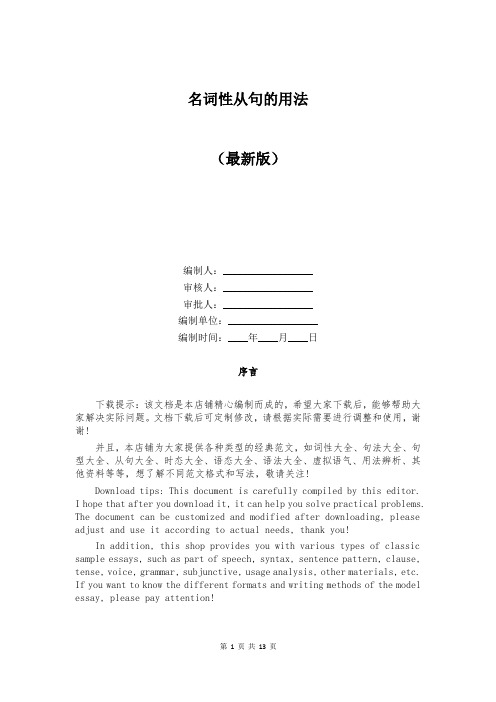
名词性从句的用法(最新版)编制人:__________________审核人:__________________审批人:__________________编制单位:__________________编制时间:____年____月____日序言下载提示:该文档是本店铺精心编制而成的,希望大家下载后,能够帮助大家解决实际问题。
文档下载后可定制修改,请根据实际需要进行调整和使用,谢谢!并且,本店铺为大家提供各种类型的经典范文,如词性大全、句法大全、句型大全、从句大全、时态大全、语态大全、语法大全、虚拟语气、用法辨析、其他资料等等,想了解不同范文格式和写法,敬请关注!Download tips: This document is carefully compiled by this editor.I hope that after you download it, it can help you solve practical problems. The document can be customized and modified after downloading, please adjust and use it according to actual needs, thank you!In addition, this shop provides you with various types of classic sample essays, such as part of speech, syntax, sentence pattern, clause, tense, voice, grammar, subjunctive, usage analysis, other materials, etc. If you want to know the different formats and writing methods of the model essay, please pay attention!名词性从句的用法在句子中起名词作用的句子叫名词从句 (Noun Clauses)。
- 1、下载文档前请自行甄别文档内容的完整性,平台不提供额外的编辑、内容补充、找答案等附加服务。
- 2、"仅部分预览"的文档,不可在线预览部分如存在完整性等问题,可反馈申请退款(可完整预览的文档不适用该条件!)。
- 3、如文档侵犯您的权益,请联系客服反馈,我们会尽快为您处理(人工客服工作时间:9:00-18:30)。
名词性分句考点归纳考点一:区别that , what 与which1. _______ he said so made us angry .2. _______ he said at the meeting made us angry.3. _______ we can’t get seems better than ____ we have.4. At last the soldiers reached ________ the locals called the Three Gorges.5. We express the hope ________ they will come to visit China again.6. We all hope ________ the 2008 Olympic Games will be the best ever, and ______ the athletes and visitors will enjoy China and Beijing.7. ---Do you know _______ Mr Black’s address is---He may live at No. 18 or No. 19 of Bridge Street. I’m not sure of ________.8. I read about it in some book or other, does it matter ______ it was9. The problem is _____ we can’t finish the work in time.10. A modern city has been set up in ______ was a wasteland ten years ago.A. whatB. whichC. thatD. where请你归纳:that不可省略的情况。
考点二:区别if 与whether1. I don’t know ___________I’ll be free tomorrow.2. I don’t know ___________ or not I’ll be free tomorrow.3. The question is ___________ this book is worth writing.4. The argument ____________ we’ll have a sports meet remains to be settled.5. It depends on ___________ we will have enough money.6. _________ they can do it matters little to us.7. He doesn’t know _________ to stay or not.8. __________ you are not free tomorrow, I’ll go without you.请你归纳:只能使用whether 的情况。
考点三:what, whatever, who, whoever1. __________ will take the position isn’t decided.2. ___________ destroys the forest will be punished .3. It is generally considered unwise to give a child ___________ he or she wants.4. Would you go and see ________ is happening outside解析:1. whoever, whatever等引导的名词性从句不含有疑问意义,相当于名词后加一个定语从句。
2. who, what 等引导的名词性从句含有疑问意义。
3. no matter…只能引导状语从句, whoever, whatever 既可引导状语从句又可以引导名词性从句.考点四:it作形式主语或形式宾语1. 他犯了那样一个错误真是遗憾。
_______ is a pity ___________________________________.2. 他来不来不重要。
_______doesn’t matter _______________________________.3. I like ___ in the autumn when the weather is clear and bright.A. thisB. thatC. itD. one解析:it 作形式宾语常用于以下句型:1.make /find/ feel / consider / think + it + adj / n + that… / to do…2.it 指代后面从句所叙述的内容, 常用like/dislike/love/hate/appreciate/make + it + if 或when从句.考点五:名词性从句的语序1. 1. The photographs will show you _______.A. what does our village look likeB. what our village looks likeC. how does our village look likeD. how our village looks like2. He asked _______ for a violin.A. did I pay how muchB. I paid how muchC. how much did I payD. how much I paid3. You can hardly imagine ______when he heard the news .A. how he was excitedB. how was he excitedC. how excited he wasD. he was how excited4. Could you tell me ________A. where do you think the accident happenedB. where you think the accident happenedC. do you think where the accident happenedD. where you think did the accidenthappen解析:名词性从句要求使用陈述句语序,不能用一般疑问句语序。
考点六:宾语从句的时态呼应1. 他相信他的梦想总有一天会实现的。
He believes ________________________________________________________.2. 请告诉我你昨天这个时候在干什么。
Please tell me _________________________________________________.3. 他说他已离开家乡十年了。
He told me ________________________________________________________.4. 老师告诉我们光是沿直线运行的。
The teacher told us _________________________________________________.解析:1. 如果主句时态是现在时或将来时,从句谓语可根据句意需要而选用任一种时态。
2. 如果主句谓语是过去时,从句谓语动词一般用过去的某种时态, 但从句表达的是客观事实、真理、自然规律等时,从句谓语通常用一般现在时。
考点七:比较以下句子1. The reason _________ we didn't trust him was _________ he often lied.2. The reason _________ he gave for his absent was __________ he was ill.Practice: Correct the error in each sentence.1. That he said at the meeting has little to do with the work we are doing.2. If your proposals will be discussed at tomorrow’s meeting has not been decided ye t.3. You can give the ticket to whomever you think needs it most.4. The mother knows well it unwise to give her children whichever they want.5. The problem remains unsettled. We all wonder how we can do about it.6. Up till now I still remember what this used to be a clean river.7. Would you please tell me when will you go to visit Mr. Brown’s organic farm8. It is certain that no matter who lets out these secrets will be punished.9. The teacher wondered where he himself has put the reference book.10. The reason why he failed in the exam was because he was too careless.Keys to the Exercises for Nominal Clauses:考点一:1. That2. What3. What, what4. what5. that6. (that), that7. what, which 8. which 9. that 10. Cthat不可省略的情况: 主语从句、表语从句、同位语从句、用it做形式宾语的宾语从句、并列的宾语从句中的后几个从句的引导词that不能省略。
